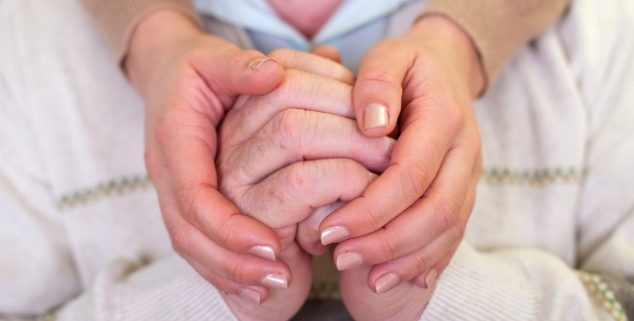Opinion
Lawmakers must give high priority to Alzheimer’s care
 An elderly patient is comforted by a young caregiver. (Photo: Ocskay Mark, via Shutterstock)
An elderly patient is comforted by a young caregiver. (Photo: Ocskay Mark, via Shutterstock)Every year, the Alzheimer’s Association releases a report providing national and state-level statistics on Alzheimer’s prevalence, mortality, cost of care and impact on caregivers. As a son caring for my father who is living with Alzheimer’s, these statistics simply cannot do justice to the huge emotional, physical and financial toll that this disease takes on families and society at large.
However, this annual report does serve as an important benchmark of the devastating impact of this disease, and the enormous amount of work we have yet to do at the state policy level to ensure timely and dignified diagnosis and quality of care for all people living with Alzheimer’s and other dementias.
Older Blacks and Hispanics are disproportionately more likely to have Alzheimer’s and other dementias.
California has over 690,000 residents aged 65 and older affected by the disease. By 2025 that number is expected to grow to 840,000 – a 21.7% increase. Additionally, more than 1 million Californians are caregivers for people living with Alzheimer’s or other dementias, providing nearly 900 million hours of unpaid care worth $18 billion last year.
This year the Association included a special report examining racial and ethnic disparities related to Alzheimer’s diagnosis and care and found that discrimination is a major barrier.
According to the report, health and socioeconomic disparities and systemic racism contribute to increased Alzheimer’s and dementia risk in communities of color. Older Blacks and Hispanics are disproportionately more likely to have Alzheimer’s and other dementias and are more likely to have missed diagnoses than older Whites.
More than one-third of Black Americans (36%), and nearly one-fifth of Hispanic Americans (18%) and Asian Americans (19%) surveyed for the report, believe discrimination would be a barrier to receiving Alzheimer’s care.
We can and must do better.
In California, the Alzheimer’s Association has a comprehensive policy platform to ensure better education, diagnosis, funding and care management for all Californians affected by this disease, with particular focus on communities of color.
The governor’s budget includes $4 million for targeted Alzheimer’s research focused on women and people of color.
The Alzheimer’s Association is proud to sponsor Senate Bill 48 by Senator Monique Limón to improve the timeliness of diagnosis in order to improve quality of care. SB 48 would require all general internists and family physicians to complete at least four hours of Continuing Medical Education (CME) on dementia every two years as part of their already-required CME.
Our experience with Alzheimer’s is like that of too many families. It took our family an aggravating year of doctor’s appointments, missed diagnoses, confusion and turmoil when my father started showing early signs of dementia. It wasn’t until a year later, after we pushed for a referral to a neurology department specializing in dementia, that we finally received a proper diagnosis, information and resources to assist with caregiving.
SB 48 will help educate physicians so they can assist families earlier in the process. Early diagnosis leads to better disease management, better health outcomes and improved quality of life for the person living with the disease and their caregivers.
We also support Gov. Newsom’s 2021-22 state budget proposals aimed at Alzheimer’s diagnosis and care. The governor’s budget includes $4 million for targeted Alzheimer’s research focused on women and people of color. Building trust within communities of color is essential to advancing research focused on these populations at highest risk of Alzheimer’s.
The proposed budget also includes $5 million for a public education campaign centered on brain health — nearly 60% of Californians with concerns about their cognitive health have not talked to a health professional – and $4 million to launch a new caregiver training and certification program.
As a family member personally impacted by Alzheimer’s and a volunteer with the Alzheimer’s Association, I’m proud of the progress California has made in recent years to adopt new policies and new funding to help with diagnosis, treatment and care.
But we have much more work to do. We all love and know someone affected by Alzheimer’s. We owe it to our families to keep up the fight.
—
Editor’s Note: Carlos Luis Olivas III is a Sacramento resident and volunteer with the Alzheimer’s Association. He’s a caregiver for his father who is living with Alzheimer’s Disease.
Want to see more stories like this? Sign up for The Roundup, the free daily newsletter about California politics from the editors of Capitol Weekly. Stay up to date on the news you need to know.
Sign up below, then look for a confirmation email in your inbox.

Leave a Reply